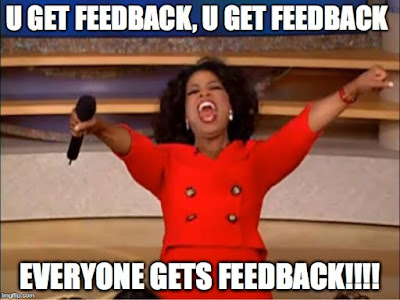The question is really, why not? Here are 5 reasons why you should allow your students to check their own work.

1. It empowers your students .
The Ohio teaching standards state that “Teachers (should) involve learners in self-assessment and goal setting to address gaps between performance and potential.” Allowing students to self-check is one way to give them a sense of ownership of their learning. My students love that they are given this control and choice. Gone are the days when I “give” my students the grade – they earn it when they demonstrate their understanding. They often know this before I do.

2. You’ll have less papers to grade.
“Back in the day” I would take home a stack of papers to grade every night. If I was lucky, I may or may not get them all graded and returned the next day which the students would quickly glance at and take home where it may (or more likely may not) be looked at by parents. Sometimes on the weekend my wife would suggest that we go see a movie or something and I’d sigh sadly, and usually reply that I just had too much to grade. Well, the days of playing the martyr and dragging home a heavy bookbag full of papers to grade are done for me. I must confess that I NEVER take papers home to grade anymore. I used to feel guilty about this, but I’ve gotten over it because I know that ultimately, this has made me a better and more responsive teacher for my students.

3. Students receive immediate feedback.
The best time for students to receive feedback is as instant as possible. Fast feedback allows students to check their work for errors and correct if needed. If a student is confused or cannot find their mistake then they are able to ask me for help. No longer do they (or I) have to wait until I have graded all of their papers to know how they are doing.

4. It allows students to correct mistakes.
My students correct everything.
Everything?
Yes, everything.
Here’s why. Math, maybe more than some other subjects, is accumulative. By that, I simply mean that new skills generally build upon other foundational skills. Say, for example, a student knows 90% of his or her basic multiplication facts. That’s pretty good, an “A” in many schools, right? The only problem is that 10% they don’t know are sure to cause problems again and again as we learn multiplication of greater numbers, multiplying fractions, long division, multiplying decimals etc…
My students know CAR stands for Correct and Return. I take a mastery approach to learning math so students work on a skill until they achieve mastery. More on the logistics of how I do this in a future post, hopefully, but generally speaking students correct problems as they go. I’m always in the loop on this, as students show me all corrections and show me all finished papers. Ultimately, I try to focus my time on working with students as they need help. Which leads me to…
5. You’ll be able up to help more students and more often.
For me, this was really the catalyst for why I started creating self-checking daily work and station activities in the first place. I soon discovered that when students were able to do this, I was free to spend more time working with the students who most needed attention. Ever wish you could clone yourself after a line of students up at you desk develops to ask you for help? I don’t… anymore.

This all sounds great, but where’s the catch?
I’ll be honest…I don’t think there is real catch. There are only a few things I can think of.
The first is cheating. If a student is doing QR coded problems for example, they could easily just scan the answer and write that down. The problem with that is that if they don’t know how to do the work, they’ll eventually get assessed on that skill with a weekly quiz and likely fail. They know they don’t move on to a new skill until previous ones are mastered so there’s really no incentives to take shortcuts in their learning. I also usually try to avert this problem by having a conversation with the students at the start of the year to explain that they are just cheating themselves.
The second problem I come across from time to time is the classic “I did it in my head” excuse. This is why I always have students show me their papers when they are finished.
The final and probably biggest obstacle is finding materials that able to be self-checked. Don’t worry, I’ve got you covered. For daily math work I have created a product for every 4th grade standard. Check some of these out if you’re interested:
Have a great week everyone!




